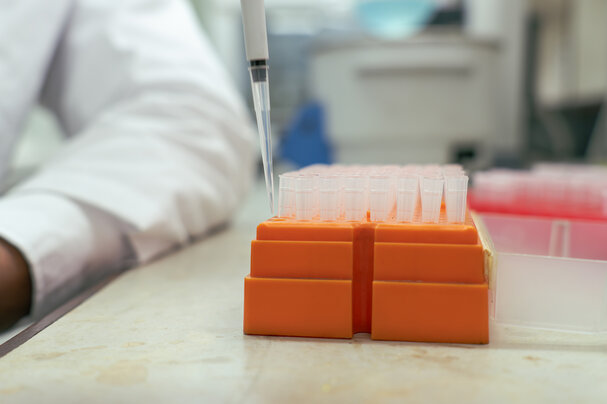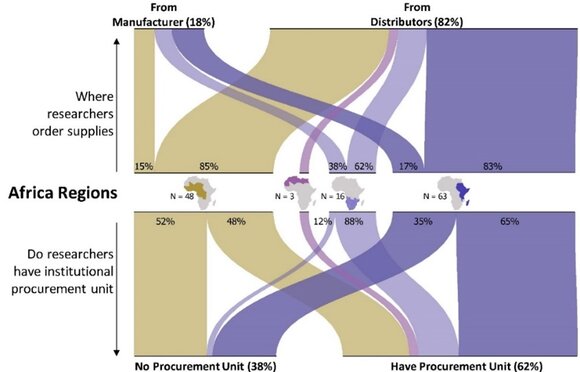
Credit: mith_67/Getty Images
Higher prices and longer wait times for basic equipment are hampering African researchers' ability to keep up with their overseas peers. Here's how funders, governments, institutions and manufacturers can make a difference.
2 July 2024

mith_67/Getty Images
Researchers in Africa are dealing with an increasingly high disease burden on a continent with the lowest gross domestic product (GDP) per capita, and the lowest level of domestic research funding. Yet, they pay more and wait longer to get laboratory supplies than researchers in richer countries.
These challenges to obtain basic consumables and equipment — including chemicals, cell-culture reagents, molecular biology reagents, diagnostic kits, glassware, thermocyclers and incubators — undermine efforts to train and retain researchers in Africa, and to cultivate self-reliant research ecosystems that can match the global pace of innovation.
Slow procurement processes severely limit African researchers’ response to emerging health, food and development challenges. They also contribute to the widening gap of global-health funding received by Africa compared with the rest of the world, because African researchers are struggling to produce results as quickly as peers in other countries, amidst logistical, political, and other factors.
We surveyed the laboratory-procurement experiences of 130 life-sciences researchers across 20 African countries to gain insights into their most pressing challenges, and what can be done to address them.
Indirect access to manufacturers
According to our survey, more than 80% of researchers procure their lab supplies from distributorships and dealerships, because they have little or no direct access to manufacturers (Figure 1). Manufacturers are mostly located in wealthy countries, and are disincentivized to provide direct access to products in Africa because of supply chain and importation customs challenges. Due to the added operational costs that are incurred by distributors and dealers, and passed on to customers, researchers in Africa typically pay a premium for basic supplies.
The prices we obtained from a major distributor in Africa for 10 commonly used molecular biology reagents and equipment, including DNA extraction kits, SAR-CoV2 diagnostic assays, pipettes and pipette tips, were 25 to 116% above the manufacturer list prices in the United Kingdom.
Inefficient institutional support for research
Managing procurement across borders can be a complex operation that requires the support of a dedicated team to manage relationships with suppliers, internal requisition processes, invoicing and payments. Our survey showed that 38% of respondents do not have institutional procurement support. This, however, varies among regions (Figure 1).
Without institutional support, researchers in Africa spend time away from research dealing with logistical and procurement-related matters. This can be especially discouraging for students and early career researchers, who have little or no experience in dealing with the life-sciences supply chain.
Survey respondents who said they do have procurement teams described inefficient processes that are steeped in bureaucracy, that are lacking in transparency and that prioritize cheaper deals over product quality. These teams sometimes lack the technical understanding to procure and handle specialized scientific consumables, such as biological specimens that need to be kept within a specific temperature range while in storage and transit, which means they disregard the urgency and importance of these processes during selection of suppliers.

Researchers in Africa do not always have direct access to manufacturers and procurement support from their institutions, according to a survey of scientists conducted by Allen Mukhwana et. al. Figure by Oluwaseyi Shorinola
Poor logistics infrastructure
It is not uncommon for researchers in Africa to wait for three to six months to get supplies delivered, due to logistical delays and lack of infrastructural capacity. This means they often only have one chance to decide on the equipment and supplies that they need for an experiment and are forced to delay experiments or use substandard alternatives if they realise that they need different supplies once the work has begun.
Some researchers use their connections in the global north to obtain supplies. During the early days of the COVID-19 pandemic, for example, African countries were on the lower rung of the procurement ladder for relevant laboratory supplies, so researchers leveraged their international collaborations in countries such as the United States to obtain them. These dynamic shifts the balance of power towards better resourced labs in the global north.
African countries generally rank low in the World Bank Logistics Performance Index on measures related to customs procedures, infrastructure and timeliness. This is especially true for procurement in the life sciences, which requires specialized shipping and storage infrastructure for transporting perishable, fragile and sometimes hazardous chemicals or molecular biology reagents that require frozen transport supplies. African governments treat scientific supplies like any other imported goods, subjecting them to protracted customs clearance processes.
When combined with government-imposed import duties, these logistical hurdles can lead to shipping fees that cost more than the actual supplies. This is unaffordable and unsustainable. Other procurement challenges that researchers in Africa face include frequent exchange-rate fluctuations, which hinder their purchasing ability. This problem is exacerbated when research is costed in local currencies but lab supplies are purchased in foreign currency. Often this difference is not factored in the budgets, which means researchers are forced to find ways to reduce costs elsewhere. There is also a lack of affordable service contracts for equipment maintenance and repair in many regions of Africa, which leads to equipment malfunctioning or falling into disrepair.
Where will the change come from?
Procurement challenges are impairing science education in Africa and contribute to academic emigration from the continent. Africa has the lowest share of researchers globally (~2.4%) and its brightest talents are choosing to relocate to ‘greener pastures’ with more timely access to research funding and supplies. Researchers returning to Africa from the diaspora often cite procurement issues as a stumbling block to their re-establishment on the continent.
There is much that can be done to make research supplies procurement more efficient for researchers in Africa. Funders, governments, institutions and manufacturers all have a role to play. Manufacturers should give African researchers the ability to procure supplies directly from them if they can afford it. Distributors will always be needed, and in some cases are better positioned to facilitate the supply chains in African countries with poor logistic infrastructure, but we urge manufacturers to review and monitor their African distribution networks to ensure faster access to their products at more competitive prices.
African institutions must also change their practices and policies to facilitate better coordination, capacity building and adoption of digital procurement platforms to improve their procurement processes. Teams or personnel should be trained to understand the research and technical requirements of the lab-supplies market and what is needed to achieve faster turnaround times. Coordination between African institutions with shared research interests and within approximate geographical regions would also be useful, as they can share best practices, reduce shipping and customs-clearance costs and give institutions better bargaining power with manufacturers to reduce processing timeframes and product prices. The UK Universities Purchasing Consortia, which brings together eight UK consortia to conduct group purchasing and share expertise, is a good example. Considering the vastness of the African continent, this could be organized regionally to reduce the challenges in the supply chain.
African governments should create customs policies that ensure a more efficient flow of supplies to researchers. The delays in getting COVID-19 supplies should provide enough motivation for this change. African governments should also provide import tax exemptions on scientific supplies for education and research purposes, as is the norm in countries such as the United Kingdom and others in the European Union. This exemption can be justified as part of African governments’ commitment to contributing 1% of their GDP to R&D.
Lastly, it is in the interest of international funders to support existing or start new initiatives to make lab-supplies procurement more efficient in Africa. When developing projects for life sciences research in Africa, funders should allow researchers to build flexibility into their budgets and timeframes to accommodate procurement-related lag.
The challenges described here are a few of many that are stifling life-sciences research in Africa. Yet African researchers are resilient and adaptable and are making significant advances, despite these roadblocks. Faster access to basic supplies will help Africa to realize its vast reserves of untapped potential in research and innovation and help its researchers to build more equitable partnerships across the globe.
About the authors:
Allen Mukhwana is head of programmes for science knowledge in society at the Science for Africa Foundation, Nairobi
Oluwaseyi Shorinola is assistant professor at the University of Birmingham, UK
Deborah-Fay Ndlovu is the acting head of corporate and science communication at the Science for Africa Foundation, Nairobi
Julius Osaso is a consultant with Lablogics LTD, Kenya
